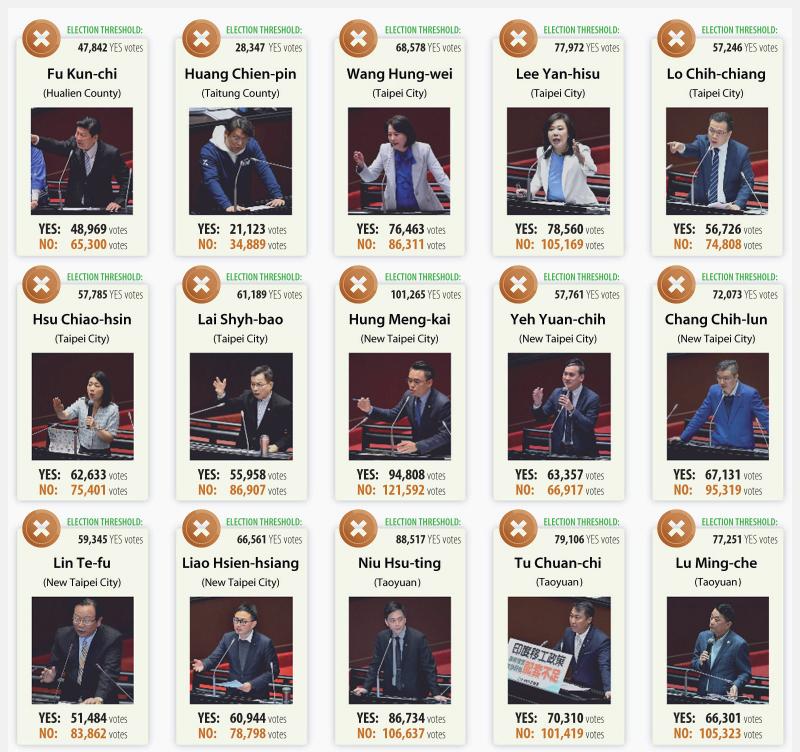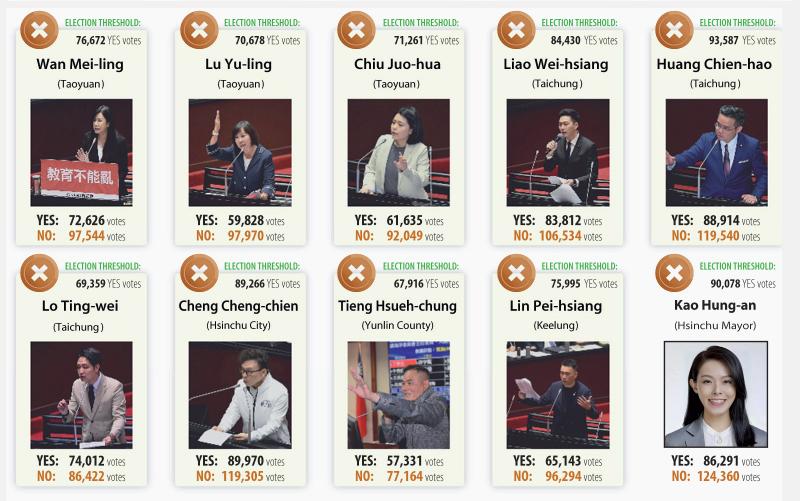All 24 lawmakers of the main opposition Chinese Nationalists Party (KMT) on Saturday survived historical nationwide recall elections, ensuring that the KMT along with Taiwan People’s Party (TPP) lawmakers will maintain opposition control of the legislature.
Recall votes against all 24 KMT lawmakers as well as Hsinchu Mayor Ann Kao (高虹安) and KMT legislative caucus whip Fu Kun-chi (傅崐萁) failed to pass, according to Central Election Commission (CEC) figures.
In only six of the 24 recall votes did the ballots cast in favor of the recall even meet the threshold of 25 percent of eligible voters needed for the recall to pass, according to CEC numbers as of 7pm. However, in all six cases, the number of votes opposing the recall exceeded those cast in favor, leading the campaigns to fail.

Photo: EPA
In the other 18 recall elections, the number of votes against the recall exceeded those in favor, and the threshold of pro-recall votes was not met as of 7pm.
It was a major defeat for the governing Democratic Progressive Party (DPP) and civic groups pushing the recall votes, which had hoped to remove lawmakers they had argued were pro-China and obstructing the government’s policies.
The pro-Taiwan DPP won last year’s presidential election, but the China-friendly KMT and the smaller TPP have enough seats to form a legislative majority bloc.

Photo: AFP
While vote counting was still under way, preliminary results showed that the recall efforts failed to remove any of the two dozen KMT lawmakers, with most surviving by sizeable margins.
The scale of the recall elections is unprecedented, with another seven KMT lawmakers facing similar votes on Aug. 23.
If the August vote results are also unfavorable to the DPP, the outcome signals that the government of President William Lai (賴清德) could continue to face strong resistance from within the legislature before the next elections, which are to take place in 2028.

Despite their huge effort, those backing the recall were facing an “uphill battle” in trying to unseat lawmakers in well-organized, strongly KMT districts, said Lev Nachman, a professor of political science at National Taiwan University and an expert on Taiwanese elections.
The result will make it even harder for Lai to push his agenda forward, especially ahead of local elections next year, Nachman said.
“At the moment, there is very little Lai can do other than try to think of other creative ways to appeal to the public,” he said.

Fu, one of the most powerful and controversial lawmakers targeted, said the result left Lai with no option other than to meet with the opposition and “find a way for Taiwan to proceed in a more stable way in this chaotic world.”
Both sides say they are for democracy.
Those who supported removing the 24 lawmakers were angry that the KMT and its allies have blocked key legislation, especially part of the defense budget, and passed controversial changes that are seen as diminishing the power of the executive and favoring China, which considers Taiwan its territory.
The opposition parties’ actions sparked concern among some Taiwanese about the nation’s democratic integrity and its ability to deter the Chinese military threat, leading to the recall campaigns.
However, the KMT said the ruling party was resorting to political retaliation after it lost the legislative majority, saying the recalls were undermining and challenging Taiwan’s democratic system.
The KMT holds 52 legislative seats, while the governing DPP holds 51 seats. For the DPP to secure a legislative majority, at least six KMT lawmakers would need to be ousted, and the ruling party would need to win the by-elections, which must be held within three months of the announcement of results.
The elections have intensified tensions between those backing the “status quo” and those favoring improved ties with Beijing. Critics accuse China-friendly politicians of compromising Taiwan’s interests and take issue with their meetings with Chinese politicians, while these politicians claim their connections are vital for dialogue given Beijing’s refusal to interact with the DPP.
The Mainland Affairs Council said on Wednesday that the Chinese authorities and state media had tried to blatantly interfere with the vote.

CHAOS: Iranians took to the streets playing celebratory music after reports of Khamenei’s death on Saturday, while mourners also gathered in Tehran yesterday Iranian Supreme Leader Ayatollah Ali Khamenei was killed in a major attack on Iran launched by Israel and the US, throwing the future of the Islamic republic into doubt and raising the risk of regional instability. Iranian state television and the state-run IRNA news agency announced the 86-year-old’s death early yesterday. US President Donald Trump said it gave Iranians their “greatest chance” to “take back” their country. The announcements came after a joint US and Israeli aerial bombardment that targeted Iranian military and governmental sites. Trump said the “heavy and pinpoint bombing” would continue through the week or as long

TRUST: The KMT said it respected the US’ timing and considerations, and hoped it would continue to honor its commitments to helping Taiwan bolster its defenses and deterrence US President Donald Trump is delaying a multibillion-dollar arms sale to Taiwan to ensure his visit to Beijing is successful, a New York Times report said. The weapons sales package has stalled in the US Department of State, the report said, citing US officials it did not identify. The White House has told agencies not to push forward ahead of Trump’s meeting with Chinese President Xi Jinping (習近平), it said. The two last month held a phone call to discuss trade and geopolitical flashpoints ahead of the summit. Xi raised the Taiwan issue and urged the US to handle arms sales to

BIG SPENDERS: Foreign investors bought the most Taiwan equities since 2005, signaling confidence that an AI boom would continue to benefit chipmakers Taiwan Semiconductor Manufacturing Co’s (TSMC, 台積電) market capitalization swelled to US$2 trillion for the first time following a 4.25 percent rally in its American depositary receipts (ADR) overnight, putting the world’s biggest contract chipmaker sixth on the list of the world’s biggest companies by market capitalization, just behind Amazon.com Inc. The site CompaniesMarketcap.com ranked TSMC ahead of Saudi Aramco and Meta Platforms Inc. The Taiwanese company’s ADRs on Tuesday surged to US$385.75 on the New York Stock Exchange, as strong demand for artificial intelligence (AI) applications led to chip supply constraints and boost revenue growth to record-breaking levels. Each TSMC ADR represents

Pro-democracy media tycoon Jimmy Lai’s (黎智英) fraud conviction and prison sentence were yesterday overturned by a Hong Kong court, in a surprise legal decision that comes soon after Lai was jailed for 20 years on a separate national security charge. Judges Jeremy Poon (潘兆初), Anthea Pang (彭寶琴) and Derek Pang (彭偉昌) said in the judgement that they allowed the appeal from Lai, and another defendant in the case, to proceed, as a lower court judge had “erred.” “The Court of Appeal gave them leave to appeal against their conviction, allowed their appeals, quashed the convictions and set aside the sentences,” the judges